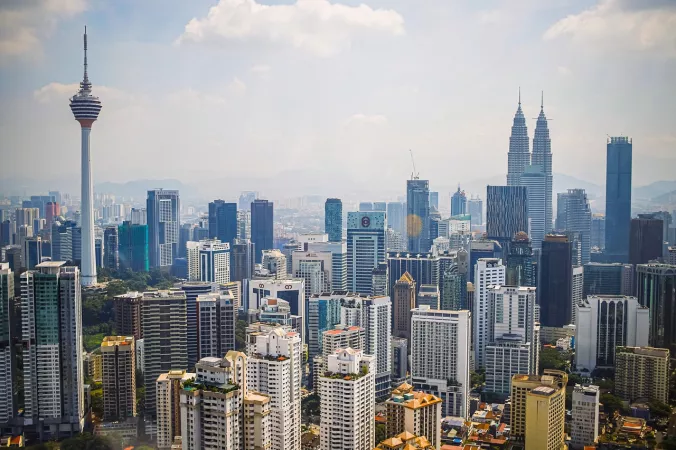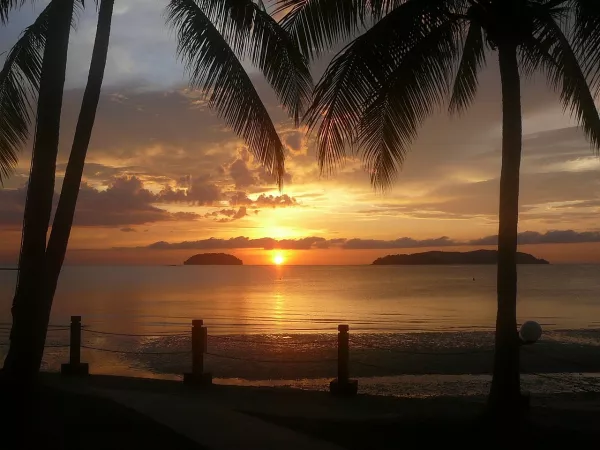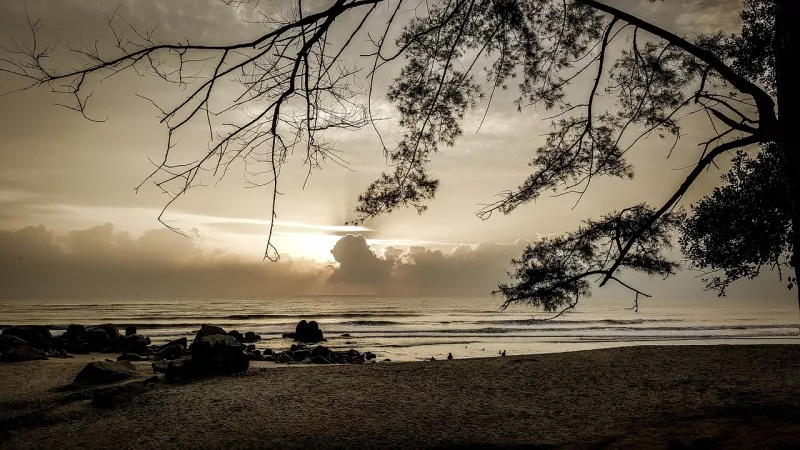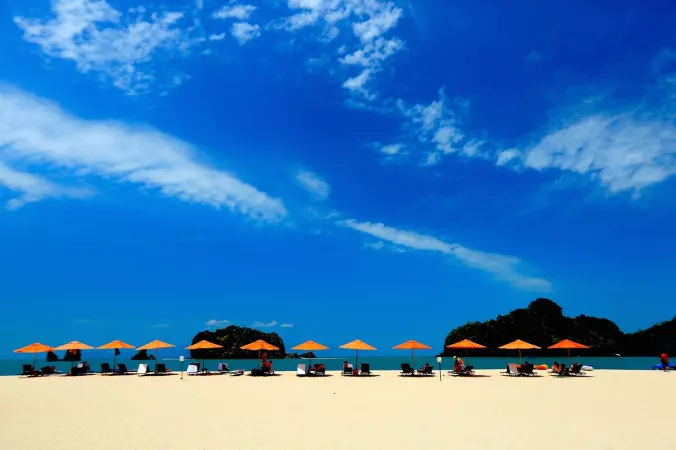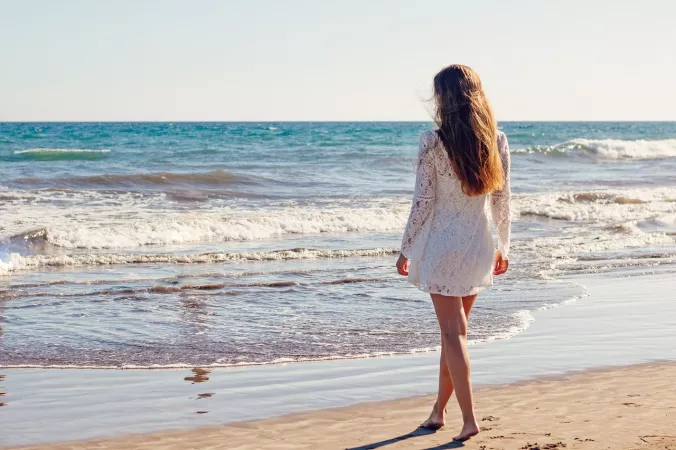
Pangkor Island Travel Guide
Pangkor Island, located off the west coast of Malaysia, is a tropical paradise known for its stunning beaches, crystal-clear waters, and lush rainforests. The island has a rich history dating back to the Dutch colonial era, and it offers a unique blend of cultural influences from Malaysia, China, and Indonesia. Pangkor Island is famous for its laid-back atmosphere, perfect for a relaxing beach getaway.Top Attractions in Pangkor Island
- Relax on the pristine beaches of Pasir Bogak and Teluk Nipah
- Explore the historic Dutch Fort and Tiger Rock
- Snorkel or dive in the clear waters of Coral Bay and Giam Island
- Visit the Pangkor Island National Park for hiking and wildlife spotting
- Experience local culture at the Fu Lin Kong Temple and the Pangkor Town Market
Pangkor Island is Famous for
Pangkor Island is most famous for its beautiful beaches, vibrant marine life, and serene atmosphere.Top Attractions in Pangkor Island
- Relaxing on the stunning beaches
- Exploring historical sites
- Engaging in water sports and outdoor activities
- Immersing in the local culture and cuisine
What's Great about Travelling to Pangkor Island?
- Perfect destination for beach lovers
- Great for families and couples seeking a peaceful retreat
- Opportunities for snorkeling and diving enthusiasts
What's Not So Great about Travelling to Pangkor Island?
- Limited nightlife and shopping options
- May not be ideal for travelers seeking a bustling city atmosphere
- Accessibility may be a challenge for some visitors
Travel Tips for Pangkor Island
- Check visa requirements before traveling
- Rent a scooter or bicycle for easy exploration
- Stay hydrated and wear sunscreen due to the tropical climate
Important Pangkor Island trip information
- Ideal Duration: A 3-4 day trip is ideal to explore the island
- Best Time to Visit: Visit between December and March for the best weather
- Nearby Airports and Railway Stations: The nearest airport is Sultan Azlan Shah Airport in Ipoh, with ferry services to Pangkor Island
FAQ's on Pangkor Island
Q1: What is the best time to visit Pangkor Island?
The best time to visit Pangkor Island is during the dry season from December to March when the weather is sunny and pleasant, making it ideal for beach activities and exploring the island. It is also less crowded during this time compared to the peak tourist season. However, if you prefer lower prices and don't mind occasional rainfall, you can also consider visiting during the shoulder seasons in April-May or September-November.
Q2: Do I need a visa to travel to Pangkor Island?
Most tourists traveling to Pangkor Island do not require a visa for stays of up to 90 days. However, it is essential to check visa requirements based on your nationality before traveling. Visitors are usually granted a visa waiver upon arrival, but it's recommended to have a valid passport with at least six months' validity.
Q3: What are the must-visit attractions in Pangkor Island?
Pangkor Island offers a range of attractions, including pristine beaches like Pasir Bogak and Teluk Nipah, historical sites such as Dutch Fort, and natural wonders like the Pangkor Hill. Don't miss out on exploring the fishing villages, trying local seafood, and snorkeling or diving to discover the underwater beauty of the island.
Q4: Is Pangkor Island a safe place to travel?
Pangkor Island is generally a safe destination for travelers. However, like any other place, it's advisable to take standard safety precautions such as safeguarding your belongings, staying aware of your surroundings, and avoiding isolated areas, especially at night. The locals are friendly and welcoming, contributing to the island's overall safety.
Q5: What is the local currency in Pangkor Island and can I use credit cards?
The local currency in Malaysia, including Pangkor Island, is the Malaysian Ringgit (MYR). While credit cards are accepted at larger establishments like hotels and resorts, it's recommended to carry cash for smaller transactions and local markets. ATMs are available on the island for your convenience.
Q6: What is the local cuisine like in Pangkor Island?
is a delightful mix of Malaysian flavors, with an emphasis on fresh seafood dishes like grilled fish, sambal prawns, and fish curry. Don't miss trying local specialties such as Nasi Lemak, Char Kway Teow, and Cendol. Vegetarian options are also available for those with dietary preferences.
Q7: What transportation options are available in Pangkor Island?
Transportation options on Pangkor Island include taxis, rental scooters, and bicycles for getting around the island conveniently. You can also explore the island on foot or take a boat tour to visit nearby attractions. Public buses and minivans offer transportation to and from the mainland.
Q8: Are there any cultural norms or etiquette I should be aware of when visiting Pangkor Island?
When visiting Pangkor Island, it's important to respect the local customs and traditions. Modest clothing is recommended when visiting religious sites, and it's customary to remove shoes before entering homes or temples. Greeting locals with a smile and a friendly "Hello" (in Malay, "Selamat pagi" for good morning) is always appreciated.
Q9: I am a travel agent. How can I buy travel leads of Pangkor Island?
Register yourself as a travel agent at agents.tripclap.com and then you can buy travel leads to Pangkor Island once your account is approved. For more details contact our support team at +91-8069186564 or support@tripclap.com

